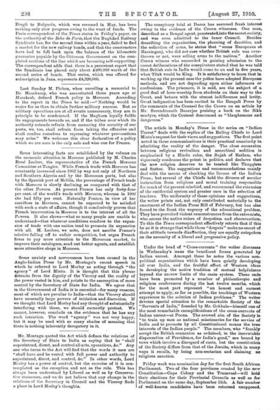The article in Monday's Times in the series on "Indian
Unrest" deals with the replies of the Ruling Chiefs to Lord Minto's request for their views and suggestions. The first point noted in these communications is their practical unanimity in admitting the reality of the danger. The close connexion between religious revivalism and anarchical sedition is emphasised by a Hindu ruler, the Rajah of Ratlam, who vigorously condemns the priest in politics, and declares that the new religion deserves to be treated like Thuggism and Suttee. The suggestions and recommendations mainly deal with the means of checking the license of the Indian Press ; but several of the Chiefs hold the divorce of secular instruction from religious and moral training responsible for much of the present mischief, and recommend the extension of the residential system and greater care in the selection of teachers. The -uniformity of these opinions and suggestions, the writer points oat, not only contributed materially to the enactment of the Indian Press Bill of February, but has also forced to the front the urgency of the educational problem. They have provoked violent remonstrances from the extremists, who accuse the native rulers of despotism and obscurantism. To this the Times correspondent effectively retorts that if this be so it is strange that while these "despots" make no secret of their attitude towards disaffection, they are equally outspoken on the necessity of a liberal and progressive policy.






































 Previous page
Previous page